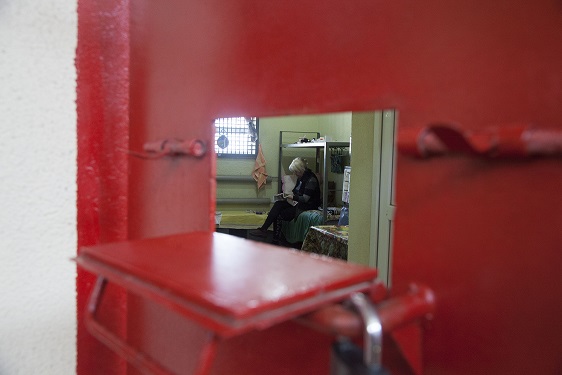The most read behind prison walls


Can anybody imagine how the literature changed the female inmates life in Rustavi Prison Colony #5? Romance and religious books are the most favorable for female inmates there. The library of this prison, that is the most comfortable library in the Georgian penitentiary system, hosts over 50 prisoners every day.
"The time goes rapidly in this library, said Natalia, the 26-year-old-girl, who is sentenced to four years.

"The time goes rapidly in this library, said one of the readers. See the full photo report from Rustavi Prison Colony n.5 "In Pictures".
She works as the librarian assistant in the prison. The romance books are her only link to the world beyond the prison walls, - the highest building for every inmate while they are imprisoned. Several different writers are helping Natalia to forget that she is a prisoner: Guy de Maupassant, Gustave Flaubert, Stefan Zweig, Orhan Pamuk are her favorite writers. And the The Museum of Innocence is her favorite novel, as for every female inmate in Rustavi Prison.
The Museum of Innocence
One of the most well-known contemporary bestsellers, by the Nobel-laureate Turkish writer Orhan Pamuk, became a part of those women who are imprisoned in Georgia. Every inmate knows about the tragic love of Kemal and Fusun. Thats why the cover page of this book is almost torn from use.

The most popular book in this library, the cover is almost torn. See the full photo report from Rustavi Prison Colony n.5 "In Pictures".
According to the prison librarian Nino Kokoshvili, the most popular novels among the female prisoners are :
- The Alchemist and 11 Minutes by Paulo Coelho
- Letter from an Unknown Woman by Stefan Zweig
- The Girl with the Dragon Tattoo by Stieg Larsson.
"Although all the inmates are keen on love story books and crime fictions, almost everyone reads the Bible and theological books. said Nino Kokoshvili, the prison librarian.
Indeed, the bookshelves are also full of theological, psychological and philosophic books in five languages: Georgian, Russian, Armenian, Azerbaijani, and English.
"This library is for every inmate in this prison. mentioned Nino Kokoshvili. "We have several Russian, Azeri and Armenian prisoners. Thats why we offer them books in native languages. As for English books, some of them, who speak English, want to read English literature for practice.
The inmate Fati Kiparoidze, winner of the special literary award for prisoners Pen (Kalami), established last year, is devoted to philosophy. She has been imprisoned for the last four years for fraud. Kiparoidze mentioned that the time is stopped in the cells and the only way to forget it, is to flee to the library. "This is the only place where you shouldnt watch at the prison bars. she said.

The prisoner Tamar Talikadze, whose hobby is painting and drawing the Christian icons, is in custody for eight years. She attempted to take her own life several times in the last six years. Talikadze considers that without this library, she would be much more stressed.
"I read Russian literature, especially Chekhovs short stories. They help me not to be depressed and also, Im inspired by some novels to paint. I even requested to the prison administration to allow me take pencils into my cell. said Tamar Talikadze.
However, there are two novels on the shelves of prison library that the female inmates avoid: The House of the Dead by Fyodor Dostoyevsky and One Day in the Life of Ivan Denisovich by Aleksandr Solzhenitsyn. These novels describe psychological portraits of the inmates of prison camps in Siberia, although the novels are a reflection of different centuries.
"Everybody knows about these novels, but they keep away from reading them. Maybe they dont want to deepen their negative feelings during the imprisonment. said the prison librarian.
A paper digital world
The prison library at Rustavi #5 also includes four computers with virtual library software. The internet is not available for the prisoners. Thats why one of the inmates appealed to the prison librarian to paint a Facebook picture on paper.
"The girl who is sentenced to 10 years asked me to draw a Facebook on the paper and explain to her how to use it. So, we had somehow managed very interesting training in computer skills without a computer. said Nino Kokoshvili.
Among the books and computer desks in the prison library, there is the childrens corner, with small pink and orange tables, toys, puzzles, and books for kids. The big plush playing caterpillar was sent from Norway for the inmates kids in Rustavi Prison, which is the only prison for women in Georgia with 240 prisoners. Five inmate females are raising children there. The smallest one is nearly 2-year-old.

5 inmate females are raising children there. The smallest one is nearly 2-year-old. See the full photo report from Rustavi Prison Colony n.5 "In Pictures".
The prison library was opened in May of 2012 with the assistance of the Ministry of Foreign Affairs of Norway. The librarian, Nino Kokoshvili and several employees of the prison have visited Norwegian prisons before the launch.
Even on the laptop screen in the Rustavi Prison library, the video footage shows inside the Halden Prison (Norway), as a showcase of the most liberal penitentiary system in the world. And on the shelf, between the various CDs, everyone can find the Halden Prison inmates rock band CD, Kenth and the Ravens.
Last year, the American newspaper Chicago Tribune published a feature story about American female inmates who have solved their feelings of solitude with the literature. "Book program shines light into female inmates' dark days was written in the beginning of the article. This sentence may refer perfectly to the inmates of Rustavi Prison Colony #5, whose life totally changed after the library was launched.
Photos by Nino Alavidze
 Tweet
Tweet  Share
Share